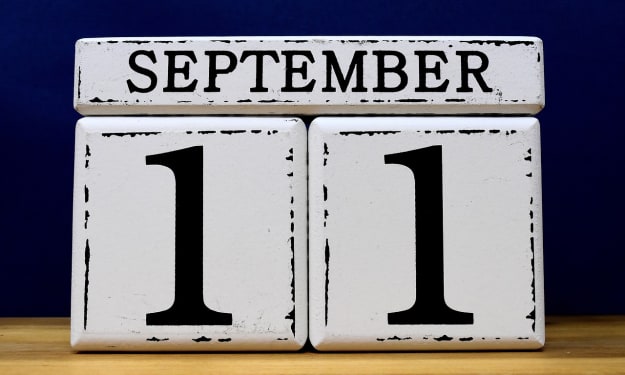Content warning
This story may contain sensitive material or discuss topics that some readers may find distressing. Reader discretion is advised. The views and opinions expressed in this story are those of the author and do not necessarily reflect the official policy or position of Vocal.
What will happens when you die
Introduction

Despite our mostly science-grounded views on death these days, it seems many of us believe in life after it. In 2014, UK citizens were polled by the Telegraph, and just under 60 percent of respondents said they believe some part of us lives on. In the U.S., still a very Christian nation, Pew Research in 2015 asked people what happened after you die. The survey found that 72 percent of Americans believed you go to heaven, which was described as a place “where people who have led good lives are eternally rewarded.” 54 percent of U.S. adults replied that they believed in hell, which was described as a place “where people who have led bad lives and die without being sorry are eternally punished.”
The belief in life after death is a deeply ingrained aspect of many religions and spiritual practices worldwide. For those who subscribe to faith-based beliefs, the concept of an afterlife provides a sense of comfort and purpose, as well as a moral framework for living a good life.
However, even among those who do not adhere to any specific religious beliefs, the idea of life after death seems to persist. Many people find solace in the notion that there may be something beyond our physical existence, whether in the form of an eternal reward or punishment, or simply as a continuation of consciousness in some way.
The concept of life after death has been the subject of philosophical debate and speculation for centuries. While science may offer explanations for the physical processes that occur after death, such as decomposition and the cessation of brain activity, the question of what happens to the essence of a person's being remains a mystery.
Ultimately, beliefs about life after death are deeply personal and often shaped by cultural, religious, and philosophical influences. Whether one believes in heaven, hell, reincarnation, or simply the continuation of energy in the universe, the idea of life after death continues to capture the imagination and curiosity of many people around the world.
Welcome to this episode of the Infographics Show, discussing what happens when you die. Make sure to subscribe and click the bell button to join our Notification Squad. Many people believe in the possibility of an afterlife, whether it be a paradise in the clouds or eternal hellfire for those who do not follow religious teachings. This belief often involves the image of a bearded red man with a pitchfork.
Physicians determine death when the heart stops beating and there is no brain activity. Brain death is considered actual death, but machines can prolong bodily functions. Cardiac death occurs when the heart stops beating and blood flow ceases.
Reincarnation, also known as deja vu, is believed by some to be connected. Buddhists think enlightenment can end this cycle and lead to nirvana. Will we go to heaven after we die, hoping to gain entrance by St. Peter? Or will we enter paradise with heavenly delights and beautiful maidens? Another possibility is that our souls will return to the Earth, distracting us from our cosmic insignificance. We can't provide the answers, but we're curious about your thoughts.
When you pass away, your muscles relax, including your sphincter. This can cause any food you ate to spill out, as well as gas that may be inside you. The same goes for urine in your bladder, making death a messy process. Men may even ejaculate after death. For women who were pregnant, they may experience "coffin birth" where they give birth posthumously.
It is a rare occurrence, but gases in the abdomen help push the newborn out instead of physical force. When the body releases trapped air, noises may be heard as air escapes. Reports from nurses and those close to deceased individuals mention hearing noises resembling moans and groans coming from dead bodies. Muscle contractions may cause twitching, but it does not indicate life. In certain cases, an erection may occur after death if the deceased was lying on their stomach and blood flowed to that area due to livor mortis, resulting in a dark purple discoloration.
Shortly after death, the body cools down as blood no longer flows through it, a process known as "algor mortis" or "death chill". Rigor mortis sets in within 2-6 hours, causing the body to become stiff due to calcium entering muscle cells. Without blood flow, cells break down, leading to bacterial growth and decomposition. The appearance of hair and nail growth is actually the skin receding. Eventually, the skin will loosen, and blisters may appear. In the stage of putrefaction, bacteria and microorganisms begin to feed on the body.
During the decomposition process, the smell can become unbearable, described as a mix of rotten eggs, feces, and a used toilet left out for an extended period. The decomposition starts with soft tissues turning into liquid while more durable parts like bones, cartilage, and hair remain intact. Decomposition begins even before burial, but embalming can slow down the process. Above ground, decomposition can lead to liquefaction within a month, attracting insects, maggots, plants, and animals. Underground, it may take 8-12 years for a body to completely decompose into a skeleton.
After approximately 50 years, your bones will eventually become part of the Earth's composition. The rate of decomposition varies based on multiple factors which are too numerous to list comprehensively here. Some individuals have reported near-death experiences as awe-inspiring, but that is not always the case. One individual shared on Reddit that their experience was simply a void of black emptiness, devoid of thoughts, consciousness, or anything tangible. French philosopher Rene Descartes believed in the separation of the soul from the body, a concept echoed in many religions, suggesting that something may linger after death. Friedrich Nietzsche introduced the idea of eternal recurrence, where all energy and existence in the universe perpetually repeats infinitely. In this model, one relives the same life repeatedly in an eternal cycle. This belief may prompt reflection on living a fulfilling life. Similarly, Buddhism teaches the concept of the "Wheel of Samsara," in which souls and lives enter a continuous cycle after death, albeit not in the same form each time.
Reincarnation, often linked to deja vu, is believed to be a way to escape a cycle by achieving enlightenment in Buddhism. Some believe in going to heaven after death, facing judgment at the Pearly Gates. Others envision a paradise of delicious food and beautiful companions. Some think our souls just dissipate, distracting us from our insignificance and futility on earth. The ultimate destination after death remains a mystery, but we're curious about your thoughts.
About the Creator
Enjoyed the story? Support the Creator.
Subscribe for free to receive all their stories in your feed.





Comments
There are no comments for this story
Be the first to respond and start the conversation.